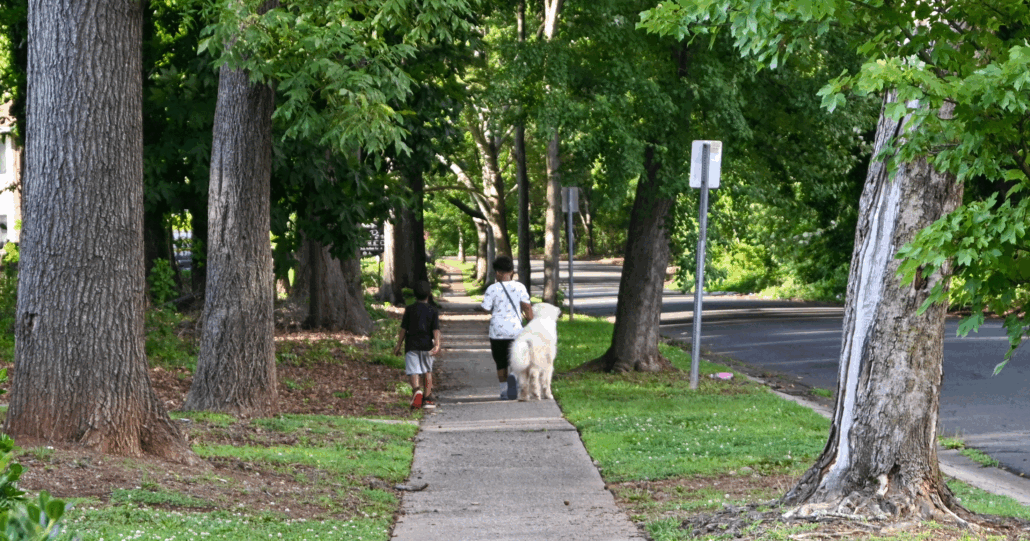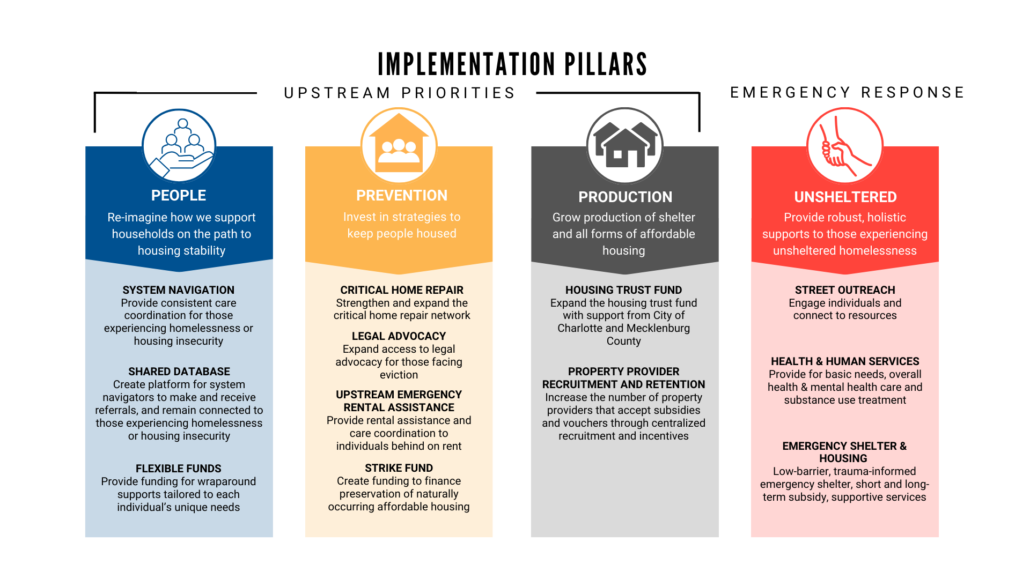A Home For All:
2023 Reflections and Look Ahead
Sarah
Mikhail
Executive Director
Time Out Youth
Bobby
Williams
Town Manager
Town of Huntersville
KT
Harcourt-Medina
Evaluation Manager
United Way of Greater Charlotte
In August, United Way of Greater Charlotte (United Way) released the A Home For All Implementation Plan. Building on the priorities identified in the Strategic Framework, the Implementation Plan outlines which priorities to advance first in order to address housing instability and homelessness across the Charlotte-Mecklenburg area. We recently posted a series of blogs examining the initial three pillars of the A Home For All Implementation Plan: People, Prevention, and Production. A fourth pillar has been added as there is an increasing need for supports related to people experiencing unsheltered homelessness. We will take a deep dive into the Emergency Response pillar next month.
This blog provides reflections on the work of the implementation teams, specifically critical home repair (Prevention pillar) and the People pillar, and a look ahead.
2023 REFLECTIONS
Looking back, it’s awesome to see over 60 partners across Charlotte-Mecklenburg come together to identify a challenge and work toward a solution. This effort marks the first comprehensive effort involving public, private and nonprofit sectors to create a comprehensive, transformative strategy to address housing instability and homelessness. The COVID-19 pandemic brought to light challenges in our community and exacerbated others. This effort will look at the full continuum of homelessness, housing and support necessary to end homelessness in Charlotte-Mecklenburg. Our implementation teams bring together partners from the city, county and towns, as well as residents, nonprofits and the private sector to share our own experiences, questions and hopes for the future of services related to housing instability and homelessness offered throughout Mecklenburg County. The connection of so many stakeholders as part of the implementation teams should lead to more discussions and greater potential for collective action and advocacy to help everyone better understand needs, address barriers and provide potential solutions.
A key part of the Prevention pillar is Critical Home Repair. Our implementation team has met over the last several months to identify a consultant to evaluate the local critical home repair ecosystem. Gentrification and challenges for those hoping to age in place was a growing challenge before the pandemic, and has become greater since much of the country has seen the cost of housing increase, in addition to all goods and services the last few years. Further compounding challenges around housing attainability is the relative vanishing of lower cost housing, due to rising tax values, corporate acquisition or other factors. This also decreases NOAH (Naturally Occurring Affordable Housing), which impacts our supply of options for those seeking housing stability.
LOOKING AHEAD
Looking ahead to 2024, a consultant will join us to evaluate our local critical home repair systems. A key part of this effort will be community engagement to focus on those with lived experience. In turn, we hope this will help us better understand the nature of needs and lead the consultant to identify ways to clear existing back logs and waiting lists of residents waiting for repair. The consultant will also be asked to evaluate the systems that lead to accessing service and if there are opportunities to centralize or otherwise improve them for better access to services and more efficient service delivery. It is important that our implementation team and consultant clearly understand the experiences of all involved, from residents to providers and those in the middle. This will help identify barriers and gaps that need to be addressed and opportunities for partners to take collective action for mutual benefit to those in need of services and those providing them.
Additionally, it will be important for our consultant to look at the adequacy of the current funding landscape for critical home repair. Federal funds tend to be one of the primary sources and often bring specific requirements that may not fully meet local needs or be accessible to all providers. This will further identify any gaps and barriers in our existing systems that need improvement to better meet current and unmet needs. This aspect of our work also brings a hope that this could lead to additional funders entering the critical home repair space.
Finally, after engaging the community and stakeholders and evaluating the existing critical home repair ecosystem, our consultant will be asked to identify a pilot program that could be undertaken to address the outcomes of their work. This could take the form of improving and/or centralizing the intake system, improving application processes, recruiting new providers, policy recommendations or identifying other funding resources.
As with all of the A Home For All initiatives, much work has been accomplished under the People pillar over the past few months. The United Way team has worked hard to build consensus from a group of dedicated and passionate nonprofit leaders, people with lived expertise, and those representing the government or private sector. The group engaged in a diligent decision-making process to choose a consultant that will provide technical assistance in piloting efforts to move the People pillar forward.
The county has over 100 programs serving people experiencing homelessness and housing instability. As it currently stands, people often struggle to navigate the system and agencies often struggle to coordinate services as people move across the system. Focusing on integrating care across the system and finding better ways for the system to communicate will make the process of receiving services more person-centered and efficient. We are looking forward to working hands-on with the consultant to ensure that all voices continue to be heard in this process of improving our system for the people we serve.
For each of the initiatives moving forward this fiscal year, the implementation team has chosen consultants to provide technical assistance in moving the work forward.
SO WHY DOES THIS MATTER?
Focusing on the four pillars – People, Prevention, Production and Emergency Response– offers a clear path for this effort to achieve its vision to be a community where homelessness is rare, brief, and non-recurring, and every person has access to permanent, affordable housing and the resources to sustain it. A Home For All seeks to create systemic change that will reduce housing instability and homelessness across our community by connecting services and housing in a more nuanced, person-directed manner. Moving these initiatives forward is an exciting step in the process. We look forward to the great work that will be done in 2024!
Visit AHomeForAllMeck.org to view the Implementation Plan, learn more about the initiative and sign up to receive email updates or follow along on Facebook or Instagram.
Sarah Mikhail, LMSW is the Executive Director of Time Out Youth, a Charlotte- based LGBTQ community center for youth ages 13-24. Sarah Mikhail is a career social worker and nonprofit leader with nearly 20 years of experience working with LGBTQ youth, youth experiencing homelessness, and system-involved youth. She is also a member of the People Pillar implementation team for A Home For All.
Bobby Williams is the Assistant Town Manager for the Town of Huntersville, where he oversees the work of numerous town departments, including Planning and Parks & Recreation among other assignments. He has a BA in Political Science and Broadcast Communication from Winthrop University and Master of Public Affairs from UNC Greensboro and nearly 18 years of service to communities in North Carolina. He is also a member of the Critical Home Repair implementation team for A Home For All.
KT Harcourt-Medina, PhD is an evaluation manager at United Way of Greater Charlotte, working on A Home For All. She is a social science researcher/evaluator with 10+ years of research & practice-based experience in program & data management. Her degrees are in Human Development and Family Science and her training is in applied research with a focus on participatory action research.



